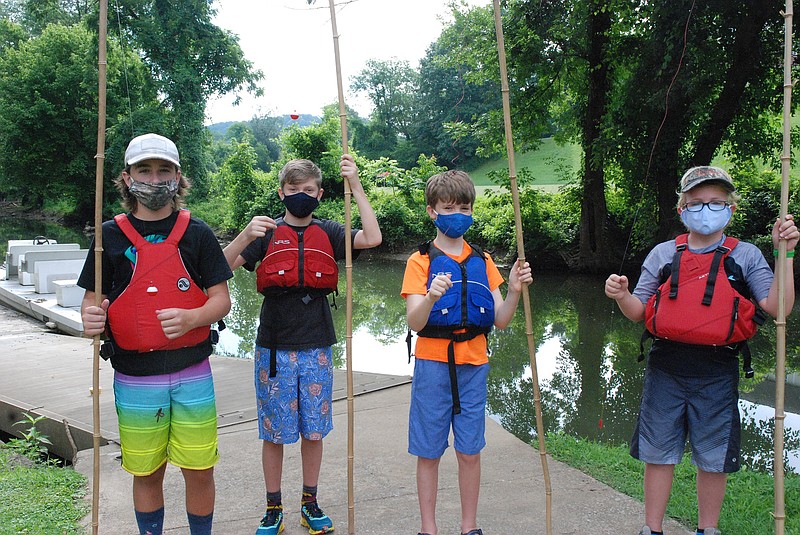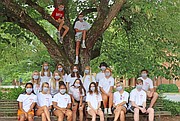Last summer, after kids had been locked down in their homes for the first few months of the pandemic, the chance to escape to summer camp had them revved up like a NASCAR engine.
"By the time that we opened, kids were just like, 'If you just want me to stand under this tree for 30 minutes, I'm going to do it,'" says Sam Green, director of auxiliary programs at Baylor School.
Last year wasn't like other summers in recent memory, with a plethora of camps from which to choose. Some camps canceled their entire summer season after COVID-19 delivered a gut punch to the world. There just wasn't enough time to totally revamp everything to make sure kids were safe. Those camps fell back and spent the time between that summer and this to develop safety plans.
Others scrambled to DEFCON 4, rearranging, rescheduling, revamping, basically rethinking everything to be able to hold last year's camps - sometimes shorter and with fewer attendees - while keeping kids safe from the virus.
As this summer looms, with COVID-19 surging and no end in sight, critical lessons learned last year are lessons to be used again this year.
"We were like, 'OK, let's think of this in a non-COVID year. What does this look like? And now let's back up and think about a COVID year. What do our capacities look like? What are the cleaning requirements for that? Do we need extra staff?'" Green says.
The mantra of "safety first" may be overworked to the point of background noise these days, but officials at summer camps in the Chattanooga area say it's the foundation of everything they're doing in 2021.
Temperatures will be checked before entering day camps or when kids wake up at overnight ones. Rapid-result testing will be used to check for positive cases if a kid or counselor exhibits possible symptoms. The number of kids allowed has been reduced, making it easier to practice social distancing, which is required everywhere. Masks at camp are a no-argument reality.
At Chattanooga Theatre Centre's Summer Academy, where students learn acting, staging, costuming and other performance aspects, masks got very little pushback, says Education Director Chuck Tuttle.
"You can't tell the adults anything, but kids are great," he says. "I did have some trouble, but most of the time I just had to say, 'Put your mask back on.'"
Even with masks, St. Andrew's-Sewanee School ditched last year's entire summer camp schedule. So did the Tennessee Aquarium.
"We just had to make the decision by April to just cancel it," says Elizabeth Duncan, director of auxiliary programs and special events at St. Andrew's who handles programming for the school's camps.
Aquarium officials came to the same conclusion, says Director of Science Education Brooke B. Gorman. Hamilton County Health Department guidelines made everyone nervous about keeping attendees safe, so Aquarium representatives canceled all camps, she says.
"As we approached late spring, we felt it was important to allow parents enough time to make alternate child care plans if we were not going to be able to run camp," Gorman says. "We made the very tough decision first to cancel June camps and later to cancel July camps as well."
Camps at both St. Andrew's and the Aquarium are back this year. The Aquarium also hopes to join forces with Reflection Riding Arboretum and Nature Center, which reduced both its number of day camps and the number of kids last year. By partnering, Reflection Riding can offer outdoor camps if the number of COVID-19 cases in the Chattanooga area reaches a level too high for an indoor camp, Gorman says.
At Baylor, things are returning to "a more normal schedule," according to Green. In 2020, the school offered four weeks of camps in 16 different activities. This year, the plan is to run 10 weeks of camps, with 60 options during the day and four overnight camps, she says.
"What we offered in 2019 is kind of mirrored in 2021," she says. "We've got some more outdoor options to make sure kids are getting outside."
Sports camps to be held outdoors include baseball, cheerleading and golf. Camp Walkabout, the overnight camp canceled in 2020, is taking place, too.
"We are blessed with a 690-acre campus, so we get to put kids everywhere and have them separated. We were really lucky in that aspect when we decided to replan," says Green.
Inside sports such as wrestling and volleyball are again taking place, along with enrichment camps in pottery, theater, rocketry and woodworking, among others. Whether they're inside or out, kids will stay with their own group throughout the day, and the number of students in each group is limited, Green adds.
CTC's Summer Academy takes place completely inside the theater center, Tuttle says, so social distancing is key. During lessons, students must stand in circles that have been drawn on the floor to ensure six feet of distance. Poles also are used - to measure, not poke - to make sure distancing is maintained, he says.
Despite the cooperation of students, CTC's classes have been reduced to one in the morning for fourth- through seventh-graders and one in the afternoon for eighth- through 12th-graders. Under that arrangement, lunch is canceled.
"They have to take their masks off to eat lunch, and you cannot keep them apart," Tuttle explains. "That's their downtime, and they go kind of bonkers on you. It also gave us a chance to clean everything."
For camps that embraced the trend of telecommuting, lunch, masks and social distancing were irrelevant last year.
Officials at St. Andrew's-Sewanee were hugely disappointed after they'd decided to host their first overnight camp. It would run for 17 days and attendees could pick, among other choices, mountain biking and pottery classes, making music on banjo or guitar, cooking lessons, and woodworking. It was brand-new. It was exciting. It was energizing.
Then it was March 2020, and it all went away.
"We were just getting our feet underneath ourselves. We just had to make the decision by April to just cancel it," Duncan says.
The school canceled all of its day camps, too.
A virtual camp was put together that took place through Zoom meetings for several weeks, but it just wasn't the same, she says.
"By that point, kids were just Zoomed out, right?"
This year, St. Andrew's plans to hold the new overnight camp canceled in 2020, and officials are hopeful the day camps can return as well.
Getting back to a familiar schedule is important for kids who missed camp last year and also have been squirreled away for months on end, says Gorman. So this summer, camps are bringing back the activities from 2019 and keeping the 2020 safety measures in place.
"We know that, after the past year, summer camp 2021 is likely to be a time that kids can start to feel a bit of normalcy," she says.
Even with the extra sanitation required and the reduced number of students allowed, at most camps, any price hike seems to be marginal. Overnight camps may raise prices somewhat because, compared to campers dropped off in the morning and picked up in the afternoon, expenses are higher when kids need places to sleep, food to eat and regular COVID-19 testing.
Baylor School has not raised its prices for day camps since 2018, Green says, but Camp Walkabout has increased.
"The demand for the camp and requirements it takes to run those sessions safely and effectively, evermore so now with COVID, requires a bump every now and then. In a time of COVID, we want to be mindful of our pricing and how it would affect the families that we serve," she says.
CTC has raised its Summer Academy fee $10, but Tuttle doesn't expect that to be an issue.
The price ranges at the Aquarium have gone up in some cases and down in others, Gorman says. There has always been a difference between members of the Aquarium and non-members, she notes, but there are price hikes in a few cases.
"For people who have had several kids go to camp across the years, they may see that going to a specialty camp for younger kids is more expensive than what they are used to, but that a general camp for older kids is less expensive than what they are used to. The overall range of prices is the same as previous years, though," she explains.
With its inaugural overnight camp canceled, St. Andrew's is in something of a pickle when it comes to pricing, says Duncan. "We are in - yet again - a unique situation."
Since this is the first year for the 17-day camp, there's no comparison to previous ones, so St. Andrew's is using other camps as a tool to set its prices.
"We have priced our camp to fall within the average for summer camp," Duncan says. "We did have to factor in the cost of arrival testing and potential surveillance testing during camp, which added slightly to the cost."
Registration for most camps started in January, so numbers are not too reflective of the ultimate number of parents that sign up, but Green says that so far, Baylor's sign-ups are about the same as in 2020. However, the real flood starts in mid- to late March, she says, and she expects parents are looking forward to this summer as much as the children.
"I think parents are excited to be able to send their kids somewhere safe for a couple of weeks," she says.

